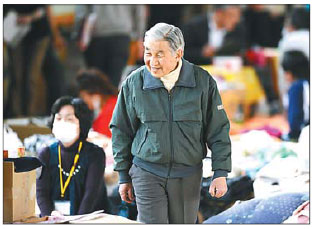Radioactive ocean water sparks worry
Beijing on Friday expressed its concern over Japan's massive dumping of radioactive water into the Pacific Ocean from a quake-crippled nuclear plant.
"Being Japan's neighbor, it is natural for us to express concern about this," Foreign Ministry spokesman Hong Lei said in a statement. "We hope the Japanese side acts in accordance with relevant international laws and takes effective measures to protect the ocean environment."
He noted that Japan has informed the Chinese side about its moves and China is closely following developments.
|
|
|
Japanese Emperor Akihito smiles as he meets evacuees from Futaba in Fukushima prefecture, at their makeshift shelter in Kazo, Saitama prefecture, on Friday. |
"At the same time, we are conducting a professional assessment and will continue to keep contact with the Japanese. We require Japan to report comprehensive and accurate information in a timely fashion," Hong said.
Kyodo News reported that Tokyo Electric Power Co, the operator of the Fukushima Daiichi power station, began dumping low-level radioactive water into the Pacific Ocean on Monday as an emergency step to secure extra room for the storage of more highly contaminated water.
The power company aimed to dump 11,500 tons of low radioactive water into the sea by the weekend.
Although Japan maintained that contamination of the sea poses no major health risk, the move is still raising concerns among neighboring countries and the public, especially fishermen.
Minor traces of radioactive materials have been detected across the Republic of Korea and some parts of China.
Seoul immediately aired concerns over the radioactive water release and asked Tokyo to allow it to conduct on-site radiation tests for seawater contamination if necessary.
Yonhap News quoted an official as saying Seoul was in the process of establishing a specific guideline by which it would determine how harmful Japan's release of radioactive water is.
No detailed international guidelines exist regarding allowable levels of radiation that can be spilled into the ocean, although treaties stipulate that countries should keep levels as low as possible.
Daily Yomiuri said nations participating in a conference sponsored by the International Atomic Energy Agency expressed concern on Wednesday over the discharge of contaminated water.
Sources said the atmosphere of the meeting clearly illustrated other nations' critical attitude toward Japan against a backdrop of delays and other problems with the disclosure of information by Japanese organizations and institutions.
The International Atomic Energy Agency has repeatedly asked Japan to improve the way it conveys information.
On Monday the UN agency stationed two additional experts on boiling water reactors in Japan to get the latest information on the nuclear power plant's situation.
So far, among nuclear power plants in the region, no abnormalities have been reported as a result of late Thursday's earthquake that jolted Miyagi prefecture.
The strongest aftershock since the March 11 earthquake killed four people and injured at least 132, according to media reports.
 0
0 








Go to Forum >>0 Comments